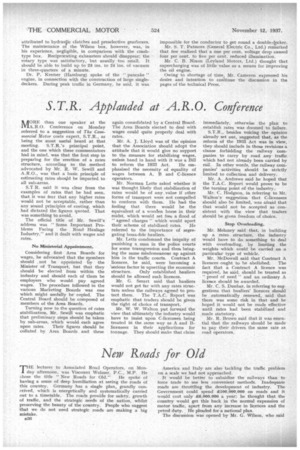S.T.R. Applauded at A.R.O. Conference
Page 20

If you've noticed an error in this article please click here to report it so we can fix it.
UTORE than one speaker at the
Conference on Monday referred to a suggestion of The Commercial Motor costs expert, S.T.R., as being the most useful heard at that meeting. S.T.R.'s principal point, and the one which these commentators had in mind, was that the first step in preparing for the erection of a rates structure, according to the method advocated by Mr. R. W. Sewill and A.R.O., was that a basic principle of estimating rates shouJd be imparted to all sub-areas.
S.T R. said it was clear from the examples of rates that he had seen, that it was fear that any higher rates would not be acceptable, rather than any sound principles of costing, which had dictated the figures quoted. That was something to avoid.
The official title of Mr. Sewill's address was " Some Important Problems Facing the Road Haulage Industry," and it dealt with wages and rates. .
No Ministerial Appointment.
Considering first Area Boards for wages, he advocated that the niembers should not be appointed by the Minister of Transport, but that they should be elected from within the industry and should each of them be employers who would pay agreed wages. The procedure followed in the various Marketing Boards was one which might usefully be copied. The Central Board should be composed of members of the Area Boards.
Turning now to the question of rates stabilization, Mr. Sewill was emphatic that preliminary steps should be taken by sub-areas, which would each agree
upon rates. Their figures should be collated by Area Boards and these again consolidated by a Central Board. The Area Boards elected to deal with wages could quite properly deal with rates.
Mr. A. J. Lloyd was of the opinion that the Association should adopt the attitude that it would give no support to the measure for stabilizing wages, unless hand in hand with it was a Bill
to reform the 1933 Act. He emphasized the necessity of equality of wages between A, B and C-licence operators.
Mr. Norman Letts asked whether it was thought likely that stabilization of rates would he of any value if other forms of transport were not compelled to conform with them. He had the feeling that there would be the equivalent of a wooden horse in their midst, which would set free a flood of agreed charges" which would upset their scheme of stabilized rates. He referred to the importance of segregating bona-fide hauliers.
Mr. Letts condemned the iniquity of punishing a man in the police courts for some transgression and then bringing the same misdemeanour up against him in the traffic courts. Contract A licences, he said, were becoming a serious factor in upsetting the economic structure. Only established hauliers should be allowed such licences.
Mr. G. Smart said that hauliers would not get far with any rates structure unless the railways agreed to protect them. The T.A.C. Report was emphatic that traders should be given the right of choice of transport.
Mr. W. W. Walton put forward the view that ultimately the industry would have to insist upon C-licensees being treated hi the same way as A and Blicensees in their applications for tonnage. They should make that claim immediately, otherwise the plan to establish rates was doomed to failure.
S.T.R., besides voicing the opinion already set out, suggested that, as the reform of the 1933 Act was in view, they should include in those revisions a clause forbidding the railway companies to carry by road any traffic which had not already been carried by rail. In other words, the railway companies' activities should be strictly limited to collection and delivery.
• Mr. A. Andrews said he hoped that the T.A.C. Report would prove to be the turning point of the industry.
Mr. C. Hodgson, in referring to Mr. Walton's suggestion that C-licensees should also be limited, was afraid that that would not be accepted as consistent with the view that traders should be given freedom of choice.
Stop Overloading.
Mr. Melaney said that, in building up a rates structure, the industry would have to do something to deal with overloading, by limiting the weights which could he carried on a particular type of vehicle.
Mr. McDowall said that Contract A licences ought to be abolished. The fact that a Contract A licence was required, he said, should be treated as 'proof of need" and an ordinary A licence should be awarded.
Mr. C. S. Dunbar, in referring to suggestions that hauliers' licences should be automatically renewed, said that there was some risk in that and he hoped it would not be made effective until rates had been stabilized and made statutory, Mr. R. Brown said that it was essential that the railways should be made to pay their drivers the same rate as road operators.








































